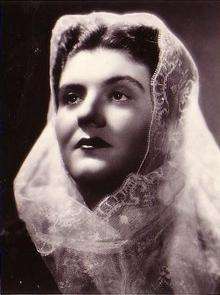Maria Caniglia

Maria Caniglia (5 May 1905 – 16 April 1979) was one of the leading Italian dramatic sopranos of the 1930s and 1940s.
Life and career
Caniglia was born in Naples and studied at the Music Conservatories of Naples with Agostino Roche. She made her professional debut in Turin as Chrysothemis in Elektra in 1930. The same year she sang Magda in Respighi's La campana sommersa in Genoa and Elsa in Wagner's Lohengrin in Rome and made her debut at La Scala in Milan as Maria in Pizzetti's Lo straniero. She sang regularly at La Scala until 1951 in the leading dramatic soprano roles in opera, such as Un ballo in maschera, La forza del destino, Aida, Andrea Chénier, Tosca and Adriana Lecouvreur. She was particularly successful in roles from the latter verismo school.
On the international scene, Caniglia appeared in venues such as the Paris Opéra, Covent Garden, and the Teatro Colón. She made her debut at the Metropolitan Opera, New York City on 21 November 1938 as Desdemona in Otello.
Caniglia participated in the exhumation of a few long forgotten operas such as Donizetti's Poliuto and Verdi's Oberto. She also participated in the creation of many contemporary works: Manuela in Montemezzi's La notte di Zoraima, Milan, 1931, Rosanna in Alfano's Cyrano di Bergerac, Rome, 1936, and the title role of Respighi's Lucrezia, Rome, 1937.
Caniglia regularly worked with the greatest conductors and singers, and left recordings of some of her great roles, notably Un ballo in maschera, and Aida (conducted by Tullio Serafin), Andrea Chénier and Tosca (conducted by Oliviero De Fabritiis), all opposite tenor Beniamino Gigli; La forza del destino (cond. Gino Marinuzzi), Don Carlo, Fedora and Zandonai's Francesca da Rimini, this last conducted by Antonio Guarnieri.
Caniglia was married in 1939 to Italian composer Pino Donati (1907–1975), who was also music director of the Verona Arena, the Teatro Comunale di Bologna, and the Chicago Lyric Opera. She died in Rome, aged 73.
References
- Alain Pâris, Dictionnaire des interprètes et de l'interpretation musicale au XX siècle (2 vols), Ed. Robert Laffont (Bouquins, Paris 1982, 4th Edn. 1995, 5th Edn 2004). ISBN 2-221-06660-X
- D. Hamilton (ed.),The Metropolitan Opera Encyclopedia: A Complete Guide to the World of Opera (Simon and Schuster, New York 1987). ISBN 0-671-61732-X
- Roland Mancini and Jean-Jacques Rouveroux, (orig. H. Rosenthal and J. Warrack, French edition), Guide de l'opéra, Les indispensables de la musique (Fayard, 1995). ISBN 2-213-59567-4
- (Italian) Maria Caniglia biography - Detailed information on her life and career on Operaclick.
- 'Caniglia, Maria' in Rosenthal, H. and Warrack, J., 1979, The Concise Oxford Dictionary of Opera, 2nd Edition, Oxford University Press, p. 80
- MetOpera database, accessed 10 December 2007